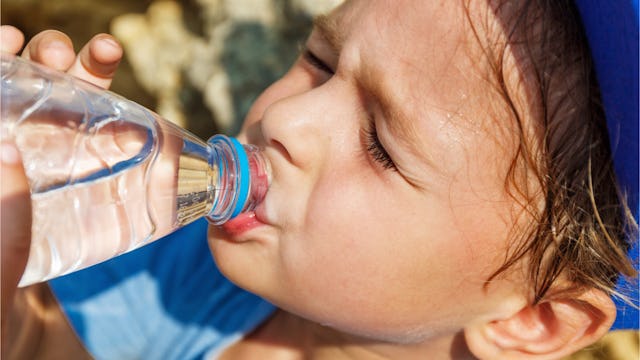Is Your Kid Drinking Enough Water? Mine Wasn't.

In the last year or so, we dealt with some health issues with one of my kids. Her symptoms included dizziness, extreme fatigue, headaches, and irregular heart rhythms. We were worried.
Her symptoms were affecting her schoolwork, and her life in general. She would get tired easily when out for the day and was missing out on doing fun things with friends. After myriad tests and doctor’s visits, and an appointment with a cardiologist, we finally got an answer.
She was dehydrated.
She is one of those kids who does not get thirsty. I’m thirsty pretty much every waking hour of my day, so it’s hard for me to comprehend that some folks just don’t get that urge to drink.
It sounds silly that the problem was just water, but her cardiologist told us that he is seeing this more frequently in kids who are prepubescent, going through puberty, and teenagers.
Any parent whose kid has been sick with a stomach virus knows that dehydration is scary. But it turns out your kid’s headaches, dizziness, or even irregular heartbeat can also be due to not drinking enough water.
I know from experience that it’s kind of a pain in the ass to stay on top of your kids to make sure they stay hydrated, especially when they go to school. I constantly pester my girl to drink water, but I’ve also learned that she doesn’t feel thirsty like the average kid does, so I have to be vigilant — or we pay the price. And the price is a lethargic kid who is cranky, overly tired, and can’t be a kid like she wants to.
With summer in full swing, it doesn’t hurt to remind ourselves to watch out for dehydration symptoms in our kids. They are playing outside more often and engaging in more physical activity than they do during the school year, so dehydration can happen pretty quickly.
Some of the common signs to look out for are infrequent urination, headaches, dizziness, fatigue, and a dry mouth. Surprisingly, according to KidsHealth.org, thirst is not a reliable early sign that your kid is getting dehydrated, because by the time they get really thirsty, they may already be suffering other symptoms of dehydration.
Water is the best solution for getting your kid the fluid they need, and if they are outside doing hot activities, having them take a break every 20 minutes or so when it’s hot is the best way to keep them from getting overheated and dehydrated.
Here are some ideas for keeping your kids hydrated during the summer, and of course, they are something to be mindful of any time any time of year. (As always, consult your doctor if you think your child is suffering from dehydration.)
– Get everyone their own water bottle, and set goals for how many bottles of water they need to drink each day. You can even give them a reward if they reach their goal. This will empower your kids to take charge of their own bodies, and remind them to sip throughout the day.
– Straws might help your kid drink more, faster. My daughter has a thing where she only wants to drink really cold water, but I noticed that she doesn’t drink as much when there’s a lot of ice added. Straws help her get the water down.
– Encourage your kids to drink even when they don’t feel thirsty. Every time I try to push fluids, my daughter tells me she’s not thirsty. But then I find her drinking water in the middle of the night, so encouraging kids to take a few drinks here and there even when they are “not thirsty” is a good idea.
– Make sure your child is getting enough downtime and rest. With my daughter, I’ve seen a correlation between rest and dehydration. Make sure that in addition to all their activity, your child is drinking and resting plenty during the day. All moms know a little screen time never hurt anyone, and if that is what it takes to get them to sit still and unwind, so be it.
I know it can be a pain to have one more thing on your mom checklist to worry about, but dehydration is an important issue that can have serious consequences (especially in summer months), so it’s something we all need to think about.
This article was originally published on